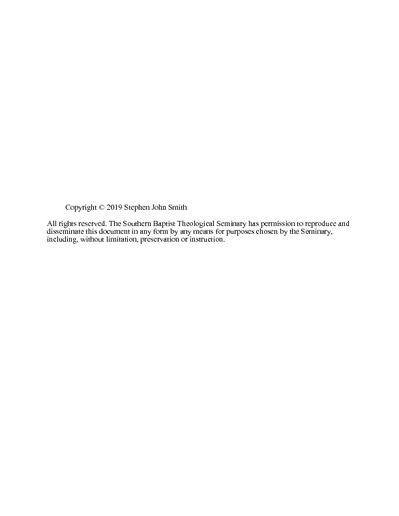| dc.contributor.advisor | Garrett, Duane A. | |
| dc.contributor.author | Smith, Stephen J. | |
| dc.date.accessioned | 2019-06-05T18:00:29Z | |
| dc.date.available | 2019-06-05T18:00:29Z | |
| dc.date.issued | 2019-04-29 | |
| dc.identifier.uri | http://hdl.handle.net/10392/5814 | |
| dc.description.abstract | This study evaluates Psalms 73–83 from an editorial-critical standpoint. Chapter 1 focuses on methodology. Chapter 2 highlights aspects of precedent research that demonstrate this study’s need: (1) lack of consensus over the collection’s structure; (2) lack of consensus over the message(s) communicated in it; (3) methodological weaknesses of previous studies.
Chapter 3 investigates the crisis of a conflict between faith and experience in the lament psalms. It lays an important foundation for the collective argument of chapters 4 through 9: Psalms 73–83 have been shaped to resolve different manifestations this singular faith crisis. Chapters 4 through 7 argue the literary unity of Psalms 73–78. Psalms 74–76 and 77–78 are two deliberate psalm groupings that constitute a larger unit, Psalms 74–78. Correspondences between this unit and Psalm 73 indicate that Psalm 73 serves as its programatic introduction. These chapters conclude that Psalms 73–78 are shaped to resolve a conflict of faith and experience precipitated by the destruction of the Jerusalem Temple. The message that Psalms 73–78 communicates is that “faith sticks to God’s self-revelation amid conflicting evidence.” Chapters 8 and 9 argue the literary unity of Psalms 79–82. This second major unit likewise consists of two smaller groupings (Pss 80–81; 79/82), which are arranged in an A (Ps 79), B (Ps 80), B’ (Ps 81), A’ (Ps 82) pattern. These chapters conclude that Psalms 79–82 are shaped to resolve the same faith crisis as the first, and to communicate the same basic theological message. Chapter 9 ends by showing that Psalm 83 is a fitting conclusion to Psalms 74–82.
Chapter 10 discusses conclusions and implications. The most important is that Psalms 73–83 give a sustained and coherent answer to a disorienting conflict of faith and experience precipitated by God’s absence in the destruction of Jerusalem and the Temple in the sixth century B.C.E: “Faith sticks to God’s self-revelation amid conflicting evidence.” Consequently, Psalms 73–83 are the high point of Psalmic faith, not a low point as is often believed. | en_US |
| dc.subject.lcsh | Bible. Psalms LXXIII-LXXXIII--Criticism, interpretation, etc. | en_US |
| dc.title | The conflict between faith and experience and the editing of Psalms 73–83 | en_US |
| dc.type | Electronic dissertation | en_US |
| dc.type | Text | en_US |
| dc.contributor.committee | Betts, Terry J. | |
| dc.contributor.committee | Schreiner, Thomas R. | |
| dc.type.qualificationname | Ph.D. | en_US |
| dc.publisher.institution | Southern Baptist Theological Seminary | en_US |
| dc.publisher.department | School of Theology | |

